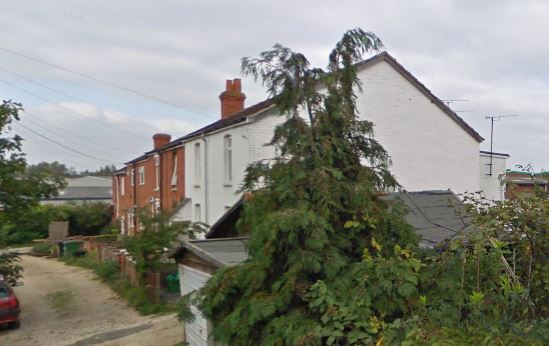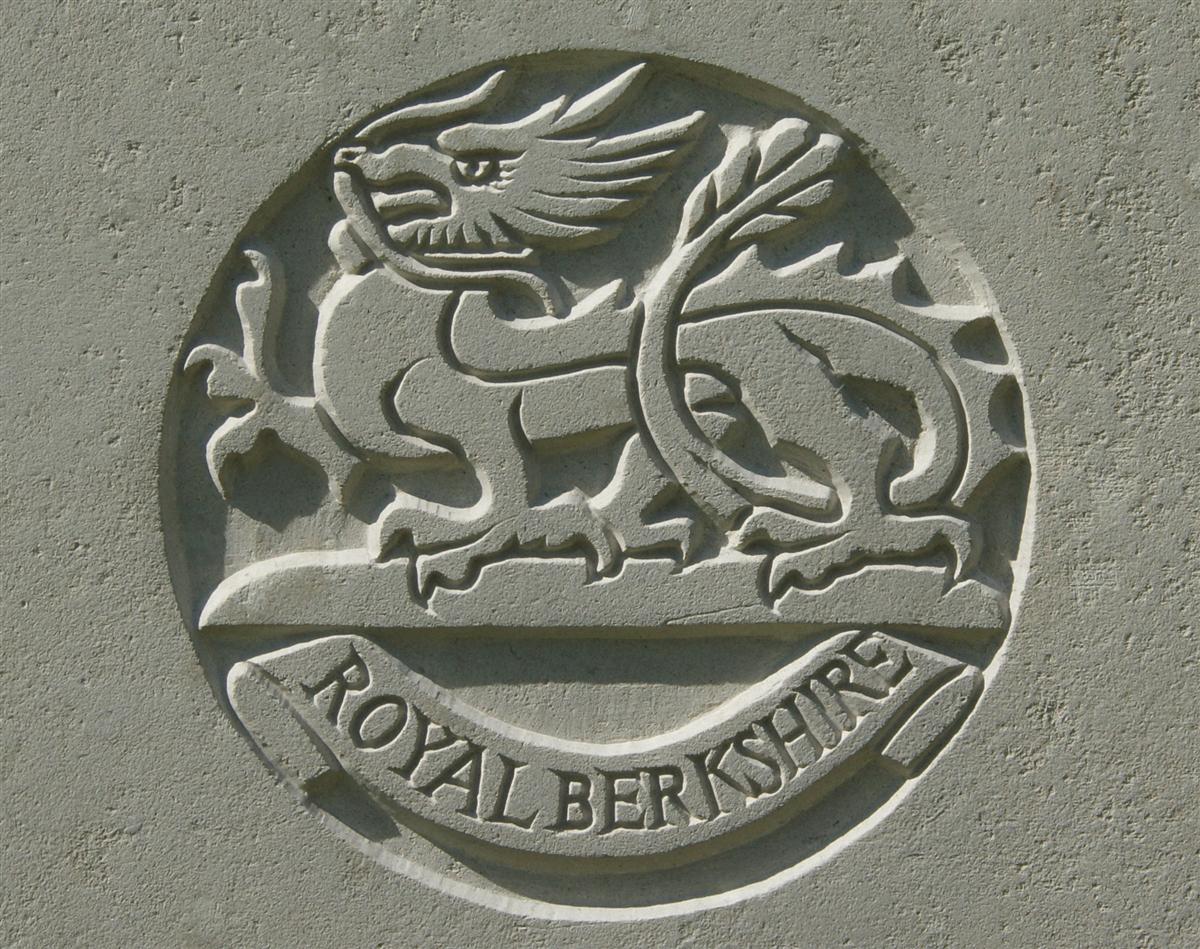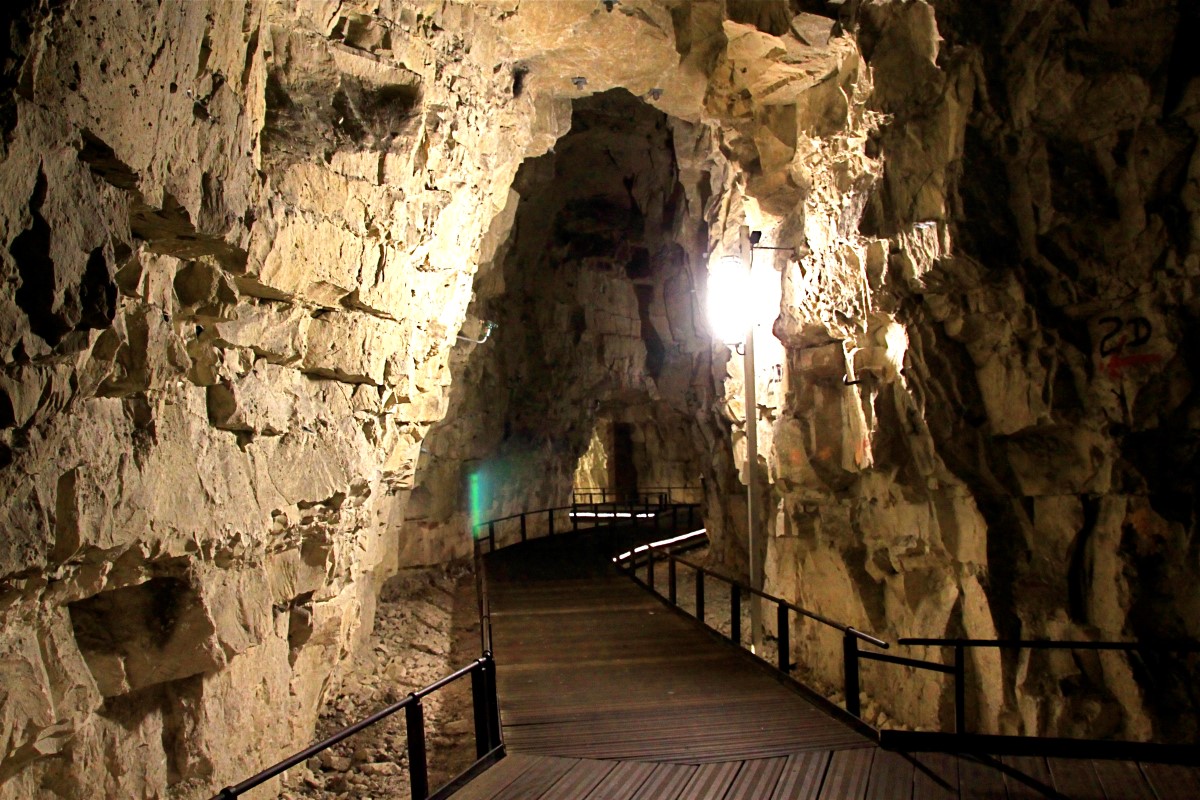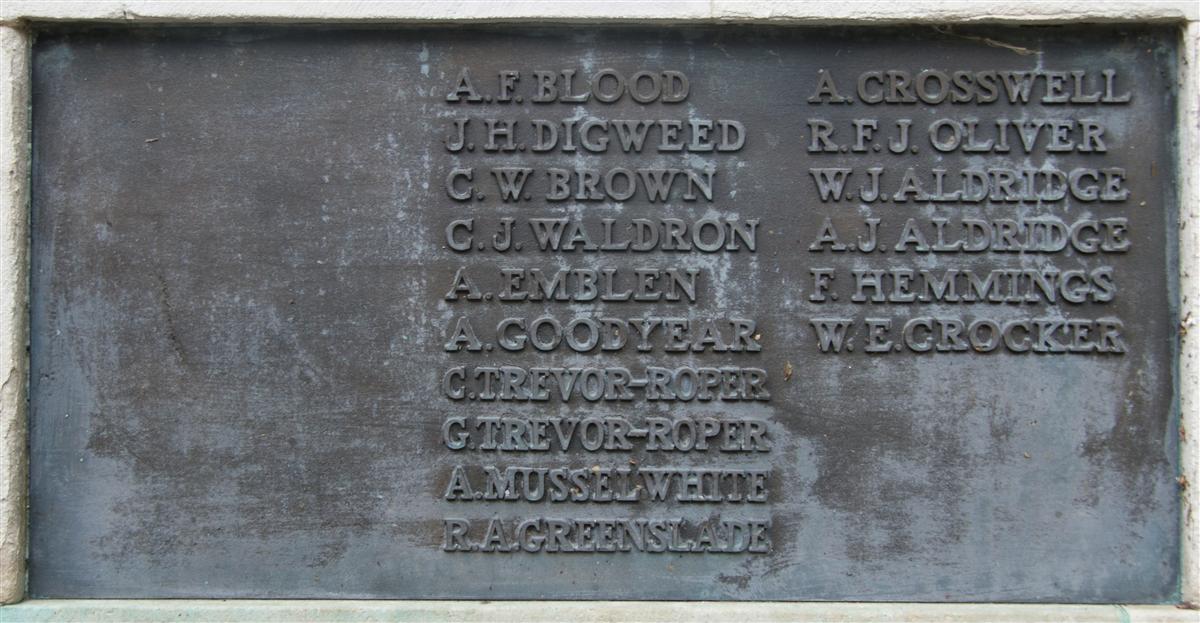Reginald Frederick James Oliver
Private 10309 Reginald Frederick James Oliver, 5th Battalion, Royal Berkshire Regt.

Junction Terrace, eight cottages tucked away off Hambridge Road - in Greenham until a boundary change in the 1930s. The Olivers lived at No. 5. |
Reginald would have left school aged 12 or 13, and in 1911 was working as a baker’s errand boy. Sadly his obituary (below) in the local paper has a line or two missing, which seem to have included information on his employment immediately before he enlisted. By that time he would have been in adult employment, perhaps continuing with the baker as a trainee baker or shop assistant.
When war broke out on 4 August 1914 Reginald was among the initial rush to enlist; he joined the local infantry – the Royal Berkshire Regiment - on 10 August 1914. He was posted to a newly formed battalion – the 5th Battalion. This was the first of a number of new battalions created by the regiment in order to take in the thousands of volunteers coming forward as a result of the declaration or war and Lord Kitchener’s appeal for men. These new battalions would form whole new armies known as K1, K2 and K3 (K for Kitchener); together they are commonly referred to as the New or Kitchener Army or Armies.

The regimental badge of the Royal Berkshire Regiment, as used on CWGC headstones. |
Eventually the battalion was deemed ready for deployment to the front and crossed to France as an integral part of the 35th Brigade in the 12th (Eastern) Division. Reginald and his comrades landed at Boulogne on 30 May 1915, one of the first New Army divisions to be deployed.
Nothing specific is known of Reginald’s service at the front; the battalion diary and various regimental histories detail in general terms what they went through, but individuals of Reginald’s rank are rarely mentioned. The battalion took part and suffered many casualties in the Battle of Loos and again in the Battle of the Somme – which Reginald appears to have survived unscathed.
However, Reginald’s brother, Montague, was mentioned in the local papers when he won a gallantry award:
Reading Mercury, 26 November 1916 – Territorial Honours
Lance-Corporal M W Oliver, Royal Berkshire Regiment, who has been awarded the Military Medal, resides at 5, Junction Terrace, Hambridge Road, Newbury. He was the linesman, and on July 22nd gallantly went through the enemy’s barrage to mend and relay lines. He is now in a convalescent hospital at Boulogne. His brother Reginald has been at the front 18 months without leave; once he was in the train but was called back to the trenches. He was in the trenches 32 days for one period without a rest, and he has been through the big push.
The story of Reginald being recalled to the line when he was sat on a leave train shows how little control soldiers had over their own lives – but he did get leave soon after, returning to Newbury for a few days just before Christmas.
On 9 April 1917 the battalion was integrally involved in the opening of the Battle of Arras; this phase of the overall offensive also has its own name – The Battle of the Scarpe. Through the previous day the 12th Division assembled in the cave and tunnel complex underneath the town of Arras. The plan was for two Brigades, the 36th and 37th to lead the way and take the initial objectives, designated as the black and blue lines; the 35th Brigade would then pass through them and take the third objective – the brown line. Part of the 6th Berks objective was an area known as Battery Valley; this lay behind the ridge on which the German lines lay and got its name from the large concentration of enemy artillery based there.

The tunnels under Arras are now a tourist attraction, far better lit than they would have been in 1917! (c) Explore Arras |
By 14.30 the battalion was ready for the final push on to the Brown line; but they had suffered delays earlier so the creeping barrage had left them behind. They were met with heavy rifle and machine gun fire. The battalion on their flanks had also been held up so further efforts were pointless. The following day, after a miserable night of snow and frost, another barrage was brought down on the Brown line and, by 12.45 the Brown Line was taken all along the 12th Division’s front. It had been one of the most successful operations of the war to date
However, success does not come at zero cost; although the casualties were light in comparison to other battles (7 killed, 96 wounded) men did die. Sadly one of those to die was Reginald, killed in action on 9 April.
A report of his death in the local paper tells of the circumstances of his passing:
Newbury Weekly News, 26 Apr 1917 – Local War Notes
News has been received by Mr and Mrs J Oliver of 5, Junction-terrace, Hambridge-road, that their son has been killed in action. He was 22 years of age, and in his civilian days [typesetter’s error - missing text] on the outbreak of war he left his native shores to join the Expeditionary Force in May, 1915. He spent a period of home leave just before Christmas. News of his death was received from his captain, to whom deceased was orderly. He said that a shell fell between them. Both fell flat, and Oliver cried out, “I’m hit, sir!” His face assumed an expression of extraordinary peace and contentment, and he passed away, his death being as instantaneous as it could be. He was not only an exceedingly good soldier, but everybody in the company were devoted to him. Drummer T J Davis, of the Battalion, also wrote saying that before going into action he asked if anything should happen to him he was to let his mother and father know, and to say his last thoughts would be of them and that he died doing his duty.
His remains were never identified (quite possibly blown to pieces or buried by a shell as it lay on the battlefield), so his name is remembered in Bay 7 at the Arras Memorial in Arras, France.

Reginald's name on Newbury War Memorial (upper right) |
Locally he is remembered on tablet 8 of the Newbury Town War Memorial and the Greenham parish memorial in St Mary’s Church.
He was also remembered on a war memorial erected in Speenhamland School , which has not survived.
Montague recovered from his wounds and served on until the end of the war; on 16 March 1919 he was discharged to the Class Z Reserve (leaving him liable to recall should hostilities break out again).
Neither of Reginald and Montague’s two younger brothers, Norman and Leonard, were old enough to serve in the war; had the war continued Norman would have faced conscription in 1919.
In 1921 Norman married Olive Keel; the following year Olive gave birth to their first child – who they named Reginald James Oliver, in memory of the uncle he would never know.

